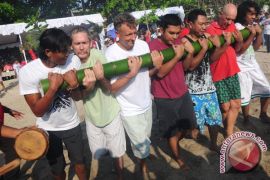Soaring prices of spices led several kingdoms to take the decision to find their own origin for the commodity, which had become known in Europe through land trade of the Silk Road.
Historian from the University of Indonesia (UI) Dr Bondan Kanumoyoso remarked that spices from Maluku Islands had a long-standing history. In fact, the archaeological excavation of the ancient kingdom of Mesopotamia at the site of Terqa, Syria, led to the discovery of a vase containing cloves named Latin Syzygium aromaticum dating back to around 1,700 BC.
"Hence, believe it or not, cloves have been traded since ancient times. However, after that, cloves did not really trend, but they have become a commodity available at high prices," Bondan remarked.
The search for spices and their producing islands began the European Age of Exploration in the 16th century, with the Portuguese being the first nation to enter the archipelago after they conquered Malacca in 1511 and made it to the Banda Islands in 1512.
Meanwhile, Spain also sent Ferdinand Magellan, who was actually Portuguese, to start their search and managed to reach Tidore Kingdom in North Maluku in November 1521, although during that time, the expedition leader had been replaced by Juan Sebastian Elcano since Magellan was killed in the Mactan war in the Philippines.
Since their arrival, the Spanish and Portuguese began to dominate the spice trade in the form of nutmeg and cloves in the Maluku Islands.
Their competition continued by taking advantage of the rivalry between the two major kingdoms in the region, Ternate and Tidore. The Portuguese allied with Ternate and Spain allied with Tidore.
Domination of the two countries began to fade when the Dutch arrived in Maluku Islands in March 1599 and succeeded in bringing home the spices. The profit from the trip was a factor in the formation of the trading alliance, Vereenigde Oostindische Compagnie (VOC), in 1602.
The VOC, with special privileges, such as owning an army and currency, negotiated with other countries until declaring war. This broad power also enabled the VOC to do everything it could to monopolize the clove and nutmeg trade in Maluku, or what is now known as Hongitochten or Hongi Voyage.
Hongitochten was a surveillance voyage undertaken to ensure there was no overproduction of spices. Using a fleet of kora-kora boats, a traditional Maluku boat, the VOC circled the islands to ensure there was no smuggling or sale to other parties.
The VOC also entered into an agreement with the kings of Maluku to strengthen the grip of the spice monopoly on the Moloku Kie Raha.
"An agreement was reached in a way that benefited the Maluku rulers, but with that the VOC could control the clove trade based on the agreement of both parties. This was what caused the VOC to enforce its monopoly by stopping spice production in North Maluku because they considered it to be a region that was very uncontrollable because of the two big sultanates of Ternate and Tidore," Bondan remarked.
At that time, in a bid to maintain the commodity prices, the VOC had begun conducting extirpation or destruction of clove and nutmeg trees to perpetuate the trade union monopoly. During the Hongitochten period, if a village was found to be growing cloves or nutmeg, they would destroy it along with its spice-producing trees and kill the residents.
Story of Afo clove
The VOC was dissolved in 1799. Indonesia became independent from the Dutch since the proclamation of 1945. However, traces of its colonialism are still apparent in several areas, including the Maluku Islands.
Makian Island in North Maluku is currently known as a walnut producing area. However, who would have ever thought that the history of walnuts on the island began when the VOC bought clove trees on the island and burned trees belonging to people unwilling to sell to them.
Hongitochten's traces there are reminiscent in the early story of the emergence of walnuts that were passed down from generation to generation through speech, according to Usman Hadi, a farmer and owner of a walnut garden in Suma Village, Makian Island.
"They bought everything from fruit, stems, and leaves to roots. In the end, cloves were indirectly lost on Makian Island," Usman stated while describing the way in which VOC had bought up clove trees on the island.
In the wake of this, the villagers' ancestors, at the foot of the active volcano Kie Besi, sought ways to maintain their livelihoods. Walnuts then became an option to replace clove commodities, or in the local language, often called gau medi, which has survived until now.
Meanwhile, the traces of Hongitochten and extirpation can still be seen in Ternate, which has the world's oldest clove tree called the Afo Clove, aged hundreds of years old.
Located on the slopes of Mount Gamalama, precisely in Tongole Village, Marikurubu Sub-District, Clove Afo is a silent witness to the local community's efforts to save cloves from the VOC monopoly.
According to the head of Clove Afo and Gamalama Spices Community Jauhar Mahmud, Afo actually refers to a large wooden tree used to hide cloves from the Dutch eyes when Hongitechten was applied.
"Afo is a wild tree that grows on all slopes of the mountain. The leaves are thick, and the trunk is large," Jauhar remarked.
Just like in Makian, at that time, the VOC bought all clove trees, from fruit, stems, and leaves to roots. During that time, this step raised concerns among members of the public, who feared that the clove commodity would become extinct in future.
The village has clove trees nicknamed Afo I, Afo II, and Afo III that are three hundred years old. However, unfortunately, Afo I, which was approximately 500 years old, collapsed around 2001. Afo II, which was 250 years old, collapsed in 2019.
What remains now is only Afo III, which is 200 years old, classified as much younger than its "brothers," who have an important role to play in maintaining the existence of this clove species in the Maluku soil.
According to Jauhar, Afo clove seeds have spread across Indonesia even to Zanzibar in Tanzania.
"The Dutch implemented a monopoly system to own as many cloves as possible. If they were unable to sell, they would burn them. Hence, farmers at that time thought this meant that their children and grandchildren would not be able to enjoy cloves. Hence, through their own initiation, the farmers planted cloves on the slopes of Mount Gamalama covertly behind the Afo tree, so that it was not visible to others," Jauhar revealed.
The heroic story of the local community saving the Clove Afo has been passed down across generations through word of mouth, and Jauhar remains resolute to preserve and enlighten the next generation about the story of Afo, whose area is currently part of the local ecotourism area.
"We need to pass this down to our children or relatives, who are here, so that we can preserve Afo," Jauhar affirmed.
Related news: Indonesian farmers should boost spice production akin to past: Jokowi
Related news: Sali Kecil, a shining exemplar of preserving nature amid limitations
Related news: Preserving forests to sustain food independence in N Maluku
Editor: Sri Haryati
Copyright © ANTARA 2021










